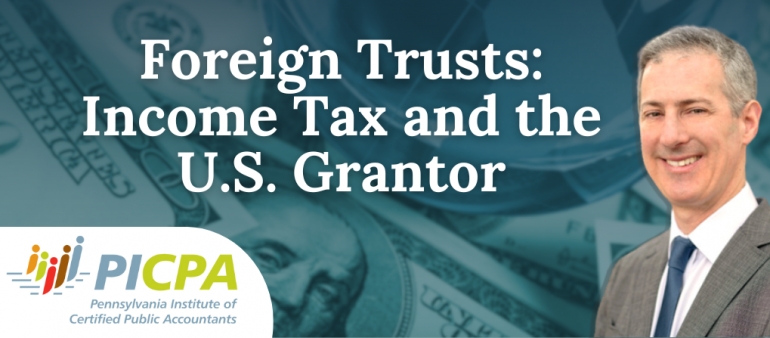Trust distributions to U.S. citizens and income tax residents carry taxable “distributable net income” to the U.S. beneficiary.[2] Additional tax may be recognized for accumulated income, unless the trust qualifies as a “grantor trust.” Grantor trusts, which are generally controlled by the founder, are ignored for income tax purposes. The assets of a grantor trust are deemed to be owned for income tax purposes by the grantor,[3] with all U.S. income taxed to the grantor.
Deemed Sale of Assets
Under certain circumstances, income tax may be imposed on the transfer of property to the foreign trust. Internal Revenue Code (IRC) Section 684 generally treats the gratuitous transfer of property by a U.S. person to a foreign trust (with no U.S. beneficiary) as a sale or an exchange of assets contributed to the trust. Section 684 deems the sale for fair market value, triggering taxable gain (but not loss) on the excess of fair market value over tax basis.
Transfers by U.S. persons to entities owned by a foreign trust are deemed transfers to the foreign trust (followed by a transfer of the asset by the trust to the controlled entity).[4] The deemed funding of an entity applies, unless the U.S. contributor is not related to a trust beneficiary or proves that the transfer is attributable to independent ownership in the entity.
The Section 684 deemed sale of trust assets does not apply to transfers to “grantor” trusts. As grantor trusts are disregarded for income tax purposes, trust assets remain owned by the grantor for income tax purposes.[5] If a foreign trust formed by a U.S. citizen or resident has a U.S. beneficiary, Code Section 679 deems the trust a grantor trust. The funding of a foreign trust by a U.S. citizen or resident, for any U.S. beneficiary (including the grantor), therefore has no immediate U.S. income tax implications.
The rules are a compromise: stopping U.S. grantors from funding foreign trusts to shelter offshore income, while including an ability to avoid deemed sale of trust assets if the grantor remains owner for income tax purposes. A U.S. grantor may thus fund a foreign trust for a U.S. beneficiary without triggering capital gains. Trust assets will generate taxable U.S. income (including income from foreign situs assets) to the grantor.
Grantor status ends upon the earlier of the foreign trust no longer having a U.S. beneficiary or the death of the grantor.[6]
Five-Year Period to Determine U.S. Beneficiaries
The determination of whether a foreign trust has U.S. beneficiaries (making the trust disregarded as “grantor” under IRC Section 679) is made annually. A foreign trust created by a U.S. resident as nongrantor (with no U.S. beneficiaries) may become grantor if a beneficiary obtains U.S. residency within five years of the grantor funding the trust. The U.S. grantor must recognize all accumulated trust income in the taxable year the NRNC beneficiary becomes a U.S. resident.[7] The U.S. grantor recognizes all income of the foreign trust for each subsequent year the foreign trust remains grantor.
If a foreign trust ceases to have a U.S. beneficiary, the U.S. grantor is treated as having made a taxable transfer to the foreign trust. Tax is recognized on the first day of the first taxable year following the last taxable year the trust had a U.S. beneficiary. The gain triggered by deemed sale of trust assets (under Section 684) includes appreciation since contribution to the trust.[8]
Deemed grantor status (avoiding the deemed sale) does not apply to foreign trusts without U.S. beneficiaries. Potential U.S. beneficiaries and future beneficiaries are, however, counted. If a foreign trust may be amended to add a U.S. person as a beneficiary, trust assets will be deemed recontributed upon U.S. residency of a beneficiary. The trust is then deemed a foreign grantor trust.[9] However, if a foreign beneficiary first becomes a U.S. resident more than five years after the trust is funded, the trust is not treated as having a U.S. beneficiary for the purposes of IRC Section 679. The exception also is not available if the beneficiary was previously a U.S. resident.[10]
Death of U.S. Settlor
Upon the death of the U.S. settlor (resident or citizen) of a foreign grantor trust, grantor status terminates.[11] Death of the grantor triggers two potential tax outcomes.[12] If trust assets are not includable in the gross estate of the U.S. grantor, they are deemed sold under Section 684 immediately prior to U.S. grantor’s death. Following the deemed sale, trust assets receive a basis step-up for a gain, but not for a loss.[13]
Foreign trust assets includable in the U.S. grantor’s gross estate are not subject to deemed sale under Section 684 upon the grantor’s death. Instead, trust assets (which avoid the deemed sale) are subject to estate tax and receive a fair market value step-up in basis on the grantor’s death.[14]
After trust assets are deemed sold or subject to estate tax, the trust is treated as an independent foreign nongrantor trust for federal income tax purposes.
1 IRC Sections 641(b), 872(a)
2 IRC Sections 652 and 662
3 IRC Sections 671-679
4 Treas. Reg. Section 1.679-3(f)
5 IRC Section 684(b)
6 Treas. Reg. Sections 1.684-2(e) (death of grantor) and 1.679-2(c)(2) (no U.S. beneficiary for foreign trust)
7 Treas. Reg. Section 1.679-2(a)(3) and (c)(1)
8 Treas. Reg. Section 1.679-2(c)(2)
9 Treas. Reg. Section 1.679-2(a)(4)(ii)(A)
10 Treas. Reg. Section 1.679-2(a)(3), Ex. 2
11 Treas. Reg. Section 1.684-2(e)
12 IRC Section 684(c); Treas. Reg. Section 1.684-3(c)(1); Treas. Reg. Section 1.684-2(e)
13 Treas. Reg. Section 1.684-1(a)
14 Treas. Reg. Section 1.684-1

Gary A. Forster
Gary Forster is the managing partner and co-founder of ForsterBoughman. His practice includes domestic and international corporate law, asset protection, tax, and estate planning. Gary handles a wide variety of corporate and personal planning matters. Gary is the author of two books. In 2013, he wrote Asset Protection for Professionals, Entrepreneurs and Investors, a guide to asset protection strategies for clients and their financial advisors, now in its second edition. In 2020, he finished the second edition of The U.S. Estate and Gift Tax and the Non-Citizen, which explains how resident and non-resident foreign nationals are impacted by the U.S. Estate and Gift Tax. Gary writes and lectures nationally to state bar and CPA groups on the topics of asset protection, international tax and corporate law. He has also instructed classes at the University of Florida (Levin College of Law) and Rollins College (Crummer Graduate School of Business). Gary’s articles can be found in such publications as the Florida Bar Journal and the American Bar Association’s Probate and Property Magazine. Gary earned a B.A. from Tufts University, graduating cum laude with majors in Economics and Spanish Literature. He received his J.D. from the University of Florida College of Law, graduating with honors. Gary continued his studies as a graduate fellow at the University of Florida College of Law, Masters of Taxation program, earning an LL.M. His education also includes studies at the University of Madrid, Oxford University and Leiden University in the Netherlands. Gary is rated AV-Preeminent by Martindale-Hubbell and speaks Spanish fluently.



 Article Written for:
Article Written for: 
